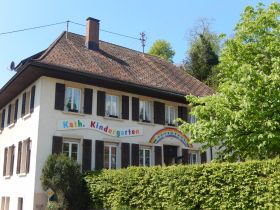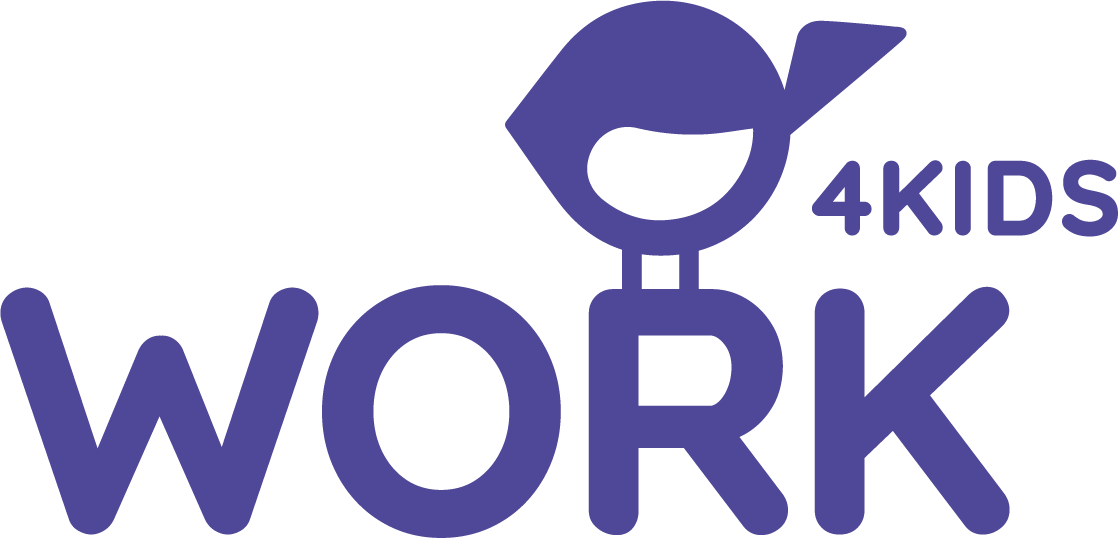Introduction/specifics
Kindergarten Regenbogen Birndorf
Einungsstrasse 27
79774 Albbruck-Birndorf
Tel. 07753/5754
email: kiga-birndorf@kath-laufenburg-albbruck.de
Sponsor:
Kath. Kirchengemeinde Laufenburg-Albbruck
Team/Staff:
Management: Brigitte Nägele
Pedagogical staff: Petra Haggenmiller, Daniela Küpfer PIA: Hasti Firoozi Javan
Substitute: Christel Bialas
Type of group:
Regular group
Type of care:
We offer 28 kindergarten places in a regular group for children from the age of three until they start school.
Opening hours:
Monday to Friday from 07.30 a.m. to 1 p.m.
Thursday from 14.00 h to 17.15 h
Pedagogical profile:
The children's right to upbringing and education are the basis for our work. It is important to us to develop the personality of the individual children, their talents and their mental, physical and social abilities. An important goal is also to give the child emotional security and safety so that it feels accepted and belongs and enjoys visiting the kindergarten.
In dialogue with the children, we allow them to take part in everyday events, offers, projects and activities. We plan these on the basis of our observations and the findings and results from our dialogues with the children. In doing so, we always focus on the developmental steps of the child. The basic assumptions of our pedagogy are self-determined learning through insight and personal responsibility of the child, who chooses his or her activities according to interest and is able and willing to make decisions on his or her own.
Our aim is to encourage and support the children in their personal responsibility, community skills and self-efficacy. The goals of our work also include:
Promotion of social behaviour
Promotion of cognitive skills
Teaching practical life activities
Environmental education and experiencing nature
Religious education
Promotion of musical abilities
Promotion of language skills
Promotion of emotional behaviour
Perceptual development
Promotion of gross and fine motor skills / promotion of movement
We also take the church cycle into account and celebrate festivals such as Christmas, Easter, St. Martin's Day and St. Nicholas' Day with the children. ..... As a Catholic institution, it is very important to us to convey and pass on Christian values and experiences of faith to the children.
In order to enable the children to learn in a variety of ways, a stimulating learning and experience environment is very important to us. In doing so, we include all rooms indoors and outdoors. Our rooms can be changed and are designed by the children depending on the situation.
There is a wide variety of activities divided into rooms that are accessible to all children.
Free play plays an important role in our daily kindergarten routine. We see free play as an important phase of learning, even if the learning that takes place during play is rather "invisible" and therefore not always immediately recognisable to outsiders. It is important for us to offer the children the space for "learning through play". Play promotes child development in a more holistic way than almost anything else.
Movement is also an important part of our work. Therefore, the children should be able and allowed to move freely in the entire kindergarten and also in the outdoor area. Together with the children, we develop rules to make this possible.
In our work we refer to the orientation plan for kindergartens in Baden-Württemberg. In doing so, we are as concerned with promoting the children to become independent, self-reliant and socially competent people as we are with promoting and developing the children in the individual areas of development.
Settling in:
It is important to us to give the children who want to attend our kindergarten a good start. In order to make it easier for the children to settle in, a careful settling-in period is necessary. We organise this in consultation and cooperation with the parents.
In the first few days and throughout the child's settling-in period, one nursery school teacher - the reference teacher - looks after the child and its parents. She builds up a relationship of trust with the child and tries to facilitate the process of separation from the parents. She is the child's first contact person and confidant. During the settling-in period, she is mainly there for the "settling-in child". The primary educator tries to make it as easy as possible for the child to settle into the kindergarten and also helps the child to make first contacts with the other children and educators.
In order to make it easier for the child to get started and to ensure a pleasant and rewarding time at kindergarten, it is important that the parents are present at the beginning and gently accustom their child to its stay at kindergarten.
In the first few days, the accompanying parent should plan enough time to be able to stay with the child in peace and without time pressure if necessary.
The length of stay of the parents and the length of stay of the children depend on the respective stage of development and the well-being or the bonding behaviour of the individual child and are therefore discussed and regulated individually.
The settling-in phase is completed when the child has succeeded in building up a bond between the child and the educator and the child allows her to comfort and also encourage it and accepts her as a caregiver.
Language development:
Children experience language as the key to the world. They learn to speak in order to be able to communicate. Through language they can communicate, name and understand things. Through language exchange, children learn new things about their environment, they learn to put their own feelings into words and gain insight into the thoughts and feelings of others.
Language acquisition takes place through observation and active experimentation. We see the support of language development as being most effective when it is integrated into everyday life, in doing things together, in playing, in listening and having time and is oriented towards the children's interests.
This can happen, for example, during
individual conversations about the child's experiences or interests
Children's conferences
discussion groups
dialogues
conflict resolution
Eating together
Language development is integrated into our daily kindergarten routine, but it does not just happen by chance. It is important for us to consider which children need which language stimuli and then to integrate these specifically into activities and offers.
Translated with www.DeepL.com/Translator (free version)




